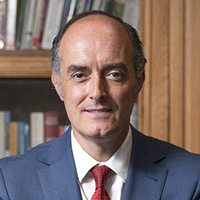Master’s Degree in International Alliances and Cooperation for Sustainable Development

Working towards sustainability
The evolution of international events in recent decades and their impact on environmental deterioration and the quality of life of millions of people has meant two great lessons for the public, private and social sectors. The first, working for sustainable development is not an avoidable option for any sector of society. Second, individual responses to international problems translate into ineffective and unsustainable solutions.
Aware of this pressing reality, the United Nations Organization promotes and leads the 2030 Agenda for Sustainable Development. With it, it summons the public, private and social sectors to work in multi-stakeholder alliance frameworks to implement said agenda and the 17 Sustainable Development Goals (SDGs).
It is time for innovation and cooperation for sustainable development. Only through alliances can the challenges faced by international society be addressed. The public, private and social sectors are, more than at any other time in our history, called to action for people, the planet and prosperity.
In this context, Nebrija University, aware of the role played by universities in sustainable development, joins the task of contributing to the implementation of the 2030 Agenda and the SDGs through the Master's Degree in International Alliances and Cooperation for Sustainable Development.
Read +This exclusive program offers a meeting space for professionals from the public, private and social sectors to promote and manage successful partnerships in favor of sustainable development.
In order to obtain the Master's degree, students must complete the full educational itinerary, made up of five thematic modules, plus the complete a final research project.
Read LessWe are a private university in Madrid, a pioneer in educational innovation, with a personalized, innovative postgraduate offer with international professional projection so that our students are the answer to the demand for new job profiles. We design cross-curricular, international and academically demanding curricula.
Student profile: The profile we seek is that of a Bachelor's/Undergraduate Degree Graduate or Engineer. University studies in a certain area is not necessary. We evaluate qualities that allow us to anticipate students' good integration in the group, such as the ability to dialogue, an open mind, willingness to share and actively participate in the course, etc. The program is enriched thanks to the varied origin of its participants, since it promotes knowledge of the management of International Relations.
Degree:Master’s Degree in International Alliances and Cooperation for Sustainable Development
Center responsible:School of Law and International Relations
Branch of knowledge: International Relations
Openings available:: 20
Total Créditos Total Credits:60 credits.
Minimum of 12 ECTS credits and maximum of 60 ECTS credits per enrollment and academic period
Duration: 1 year. From October to June
Type of education: Online
Academic Regulations: General student’s regulations. Credit transfer and recognition. Regulation of student participation. Common procedures for carrying out the Final Research Project
University Services: [+info]
A program with a multi-stakeholder approach in specific sectors and areas of sustainable development and the SDGs
Curriculum
The student must take 60 credits
First Semester 17 ECTS
MOD 1. Sustainable development on the international agenda- 3 ECTS | Sustainable Development in the context of development cooperation
- 3 ECTS | Multi-stakeholder alliances for sustainable development
MOD 2. Public sector and Agenda 2030- 3 ECTS | Government and intergovernmental actors in sustainable development and the 2030 Agenda
- 3 ECTS | Public policies for sustainable development
- 3 ECTS | Implementation of the 2030 Agenda and the SDGs in the territories
- 2 ECTS | Case Study Workshop
Second Semester 43 ECTS
MOD 3. Private sector and Agenda 2030- 3 ECTS | Private sector actors in sustainable development and the 2030 Agenda
- 3 ECTS | Framework for companies facing the challenge of the 2030 Agenda and SDGs
- 3 ECTS | Companies and Social Responsibility in sustainable development
- 2 ECTS | Case Study Workshop
MOD 4. Social initiatives and Agenda 2030- 3 ECTS | Entrepreneurship and social innovation for sustainable development
- 3 ECTS | Education and awareness for sustainable development
- 3 ECTS | Political advocacy for civil society organizations within the framework of the 2030 Agenda
- 2 ECTS | Case Study Workshop
MOD 5. Management of sustainable development and international cooperation projects- 3 ECTS | Planning and project management
- 3 ECTS | Monitoring and evaluation of projects
- 3 ECTS | Gender perspective applied to sustainable development projects
- 3 ECTS | Human rights-based approach applied to sustainable development projects
MOD 6.Master’s Final Research Project- 9 ECTS | Preparation and defense of the FRP
Information of the Subjects
Professors
| Profesores Professors | Porcentaje de Doctores (ECTS) Percentage of PhD holders |
| 27 | 75,86% |
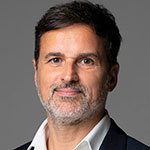 José Luis Guijarro Alonso
Director del Máster en Mercado de Arte y Gestión de Empresas Relacionadas / Profesor de Mercado Primario: galerías y ferias / Cuestiones de Economía del arte, Creación de empresas de arte / Tutor del Trabajo de fin de Máster
Director of the Master's Degree in Art Market and Management of Related Companies / Professor of Primary Market: galleries / Issues of art economics, creation of art companies / Tutor of the Master's thesis
José Luis Guijarro Alonso
Director del Máster en Mercado de Arte y Gestión de Empresas Relacionadas / Profesor de Mercado Primario: galerías y ferias / Cuestiones de Economía del arte, Creación de empresas de arte / Tutor del Trabajo de fin de Máster
Director of the Master's Degree in Art Market and Management of Related Companies / Professor of Primary Market: galleries / Issues of art economics, creation of art companies / Tutor of the Master's thesis
 José Aguilar López
Profesor de Dirección de personas y negociación
Professor of People management and negotiation
José Aguilar López
Profesor de Dirección de personas y negociación
Professor of People management and negotiation
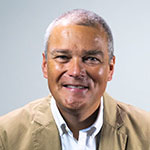 Pablo Álvarez de Toledo Muller
Profesor de Profesor de Gestión de galerías
Professor of Gallery management
Pablo Álvarez de Toledo Muller
Profesor de Profesor de Gestión de galerías
Professor of Gallery management
 Diana Angoso de Guzmán
Profesora de las asignaturas Pintura, ecultura y grabado y Arte desde los años 60
Professor of the subjects Painting, sculpture and engraving and Art since the 60s
Diana Angoso de Guzmán
Profesora de las asignaturas Pintura, ecultura y grabado y Arte desde los años 60
Professor of the subjects Painting, sculpture and engraving and Art since the 60s
 Manuel Arsenio Antón Salas
Profesor de Vanguardias artísticas
Professor of artistic avant-garde
Manuel Arsenio Antón Salas
Profesor de Vanguardias artísticas
Professor of artistic avant-garde
 Magdalena Correa Larraín
Profesora de Pintura, escultura y grabado
Professor of Painting, sculpture and engraving
Magdalena Correa Larraín
Profesora de Pintura, escultura y grabado
Professor of Painting, sculpture and engraving
 Carlos Delgado Mayordomo
Profesor de Práctica de crítica de arte
Professor of Art Criticism Practice
Carlos Delgado Mayordomo
Profesor de Práctica de crítica de arte
Professor of Art Criticism Practice
 Beatriz Espejo Arce
Profesora de Mercados Emergentes: China, India y Latinoamérica
Professor of Emerging Markets: China, India and Latin America
Beatriz Espejo Arce
Profesora de Mercados Emergentes: China, India y Latinoamérica
Professor of Emerging Markets: China, India and Latin America
 Rubén Fernández-Costa O'Dogherty
Profesor de Márketing y Comunicación
Professor of Marketing and Communication
Rubén Fernández-Costa O'Dogherty
Profesor de Márketing y Comunicación
Professor of Marketing and Communication
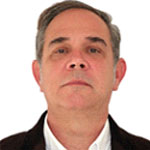 Luis Garciga Romay
Profesor de Prácticas académicas externas
Professor of external academic internships
Luis Garciga Romay
Profesor de Prácticas académicas externas
Professor of external academic internships
 Almudena Gomiz Macein
Profesora de Aspectos legales del mercado del arte
Professor of Legal aspects of the art market
Almudena Gomiz Macein
Profesora de Aspectos legales del mercado del arte
Professor of Legal aspects of the art market
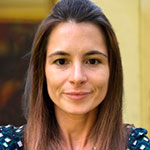 Mónica González-Adalid Práxedes
Profesora de Mercados Tradicionales: Europa y Estados Unidos
Professor of Traditional Markets: Europe and the United States
Mónica González-Adalid Práxedes
Profesora de Mercados Tradicionales: Europa y Estados Unidos
Professor of Traditional Markets: Europe and the United States
 Elisa Hernando Calero
Profesora de Técnicas de tasación
Professor of Appraisal techniques
Elisa Hernando Calero
Profesora de Técnicas de tasación
Professor of Appraisal techniques
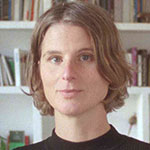 Violeta Janeiro Alfageme
Profesora de Gestión de galerías espacios expositivos
Professor of Gallery management exhibition spaces
Violeta Janeiro Alfageme
Profesora de Gestión de galerías espacios expositivos
Professor of Gallery management exhibition spaces
 Emilio López Galiacho Carrilero
Profesor de Nuevos Medios
Professor of New Media
Emilio López Galiacho Carrilero
Profesor de Nuevos Medios
Professor of New Media
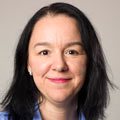 Amelia Meléndez Táboas
Tutora del trabajo de fin de Máster
Tutor of the Master's thesis
Amelia Meléndez Táboas
Tutora del trabajo de fin de Máster
Tutor of the Master's thesis
 Victoria Isabel Moreno Gil
Profesor de Prácticas académicas externas
Professor of external academic internships
Victoria Isabel Moreno Gil
Profesor de Prácticas académicas externas
Professor of external academic internships
 Andrea Pacheco González
Profesora de Comisariado
Professor of Curation
Andrea Pacheco González
Profesora de Comisariado
Professor of Curation
 Julieta L. Rafecas González de Tanago
Profesora de Mercado secundario: subastas
Professor of Secondary Market: Auctions
Julieta L. Rafecas González de Tanago
Profesora de Mercado secundario: subastas
Professor of Secondary Market: Auctions
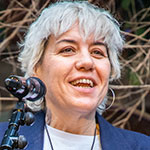 M. Mar Ramos Rodríguez
Coordinadora Académica Prácticas Curriculares
Academic Coordinator of Curricular Internships
M. Mar Ramos Rodríguez
Coordinadora Académica Prácticas Curriculares
Academic Coordinator of Curricular Internships
 José Luis Requena Bravo de Laguna
Profesor de Arte hasta el siglo XIX
Professor of Art until the 19th century
José Luis Requena Bravo de Laguna
Profesor de Arte hasta el siglo XIX
Professor of Art until the 19th century
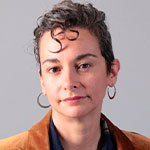 Claudia Rodríguez-Ponga Linares
Profesora de Conceptos del Arte Actual
Professor of Concepts of Current Art
Claudia Rodríguez-Ponga Linares
Profesora de Conceptos del Arte Actual
Professor of Concepts of Current Art
 Juan Arturo Rubio Arostegui
Profesor de Metodologías de la investigación en Ciencias económicas y empresariales
Professor of Research Methodologies in Economics and Business Sciences
Juan Arturo Rubio Arostegui
Profesor de Metodologías de la investigación en Ciencias económicas y empresariales
Professor of Research Methodologies in Economics and Business Sciences
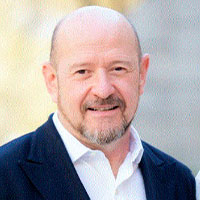 Carlos José Urroz Arancibia
Profesor de Mercado primario: galerías y ferias
Professor of Primary Market: galleries and fairs
Carlos José Urroz Arancibia
Profesor de Mercado primario: galerías y ferias
Professor of Primary Market: galleries and fairs
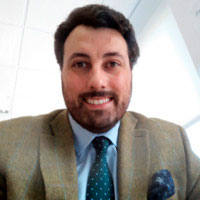 Ulpiano J. Vázquez Martínez
Profesor de Dirección financiera
Professor of Financial Management
Ulpiano J. Vázquez Martínez
Profesor de Dirección financiera
Professor of Financial Management
More Academic Information
Competences
General Competences- 1. Students acquire up-to-date knowledge on International Relations and sustainable development.
- 2. Students are able to systematically understand complex concepts, relevant information, its context and how to apply it to specific situations, taking into account how it affects the different actors and agents in each situation.
- 3. Students have the ability to apply the knowledge acquired in solving problems in new or little-known environments within broader (or multidisciplinary) contexts related to their study and professional area.
- 4. Students are able to play different roles within a multidisciplinary and multi-actor team.
- 5. Students are capable of adding value to the organization through their creativity, knowledge and significant participation.
- 1. Ability to understand in depth the current dynamics of sustainable development in the national and international frameworks from the perspective of its actors.
- 2. Ability to understand the tensions and challenges faced by sustainable development actors.
- 3. Ability to analyze and understand the implications of the international development agenda and transfer it to the local sphere.
- 4. Ability to propose action strategies in the field of sustainable development that are appropriate for the nature of the actors involved.
- 5. Ability to develop strategic thinking adapted to the needs and requirements of sustainable development actors.
- 6. Ability to develop negotiation skills and management of alliances and multidisciplinary projects in multi-stakeholder contexts.
Online Study
Admission Requirements
It will be necessary to have an official university degree: Associate's, Undergraduate or Bachelor's degree. Likewise, university graduates from foreign educational systems may access these studies without the need for homologation of their diplomas, provided that they accredit a level of education equivalent to the corresponding official Spanish university degrees and that they grant access to these studies in the country issuing the diploma. Students must submit a certified copy of their university diploma before the start of the program.
Employability
The Master's Degree in International Alliances and Cooperation for Sustainable Development responds to the need to have expert professionals in the different areas related to development cooperation, and its transversal axes, which implies its application in different fields and requires specific training, and with a focus on human rights.




